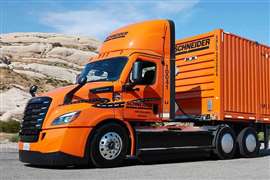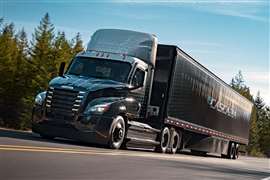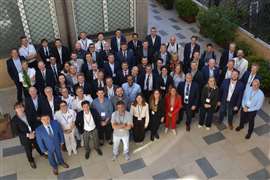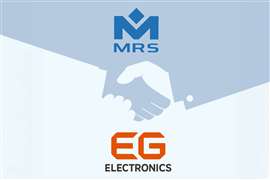Read this article in Français Deutsch Italiano Português Español
Schneider achieves 6 million zero-emission miles with eCascadias
16 December 2024
Transportation provider Schneider National, Inc. announced that its battery electric vehicle (BEV) fleet has surpassed 6 million zero-emission miles. The company said the achievement means Schneider has reduced carbon dioxide (CO2) emissions by 20 million pounds since the company started using BEVs — equivalent to removing over 2,100 gas-powered passenger vehicles from the road for one year.
Schneider said it operates one of the largest BEV fleets in North America, which includes nearly 100 Freightliner eCascadias from Daimler Truck North America (DTNA).
David Carson, senior vice president, Sales and Marketing at DTNA, said Schneider’s achievement “is a reminder for us all to keep working on overcoming challenges together on the path to zero emissions.”
The eCascadias primarily operate in Southern California. Schneider said its fleet was made possible through a number of grants from organizations such as the California Air Resources Board (CARB) and the California Energy Commission’s Joint Electric Truck Scaling Initiative (JETSI), with additional support from the South Coast Air Quality Management District (AQMD).
To power the fleet, Schneider operates a charging depot at its Southern California Operations Center in South El Monte. The depot provides 16 350 kW dual-corded dispensers, allowing the company to charge 32 trucks simultaneously.
Schneider said its aggressive sustainability goals and continued investment in energy-efficient equipment also support customers in meeting their own sustainability ambitions. Its BEV fleet has been a key differentiator for customers looking for more efficient transportation solutions. For example, Schneider said in 2023, it was the first third-party carrier to haul zero-emission shipments for PepsiCo globally, traveling more than 31,000 zero-emission miles in a few months.
“As the first partner using their electric fleet, we’ve demonstrated the power of cross-industry collaboration in reducing emissions,” said David Allen, vice president and chief sustainability officer, PepsiCo Foods North America.
In addition to customers, Schneider said its drivers have also embraced the electric trucks because of the excellent on-road experience they create. The feedback has been overwhelmingly positive, with drivers appreciating the smooth ride, reduced engine noise and ease of steering.
“Once you drive an electric truck, you won’t want to go back to a diesel truck,” said longtime Schneider driver Marty Boots. “The ride quality and the quietness make a huge difference in our daily operations.”
Schneider said it has goals to reduce CO2 emissions by 7.5 percent per mile by 2025 and achieve a 60 percent reduction in CO2 emissions per mile by 2035. The company is exploring a variety of solutions to reduce carbon emissions in addition to the BEVs, such as renewable natural gas and hydrogen internal combustion engines. Additionally, Schneider said all its non-BEV tractors currently use a mixture of biodiesel and conventional diesel, thereby reducing traditional diesel consumption.
POWER SOURCING GUIDE
The trusted reference and buyer’s guide for 83 years
The original “desktop search engine,” guiding nearly 10,000 users in more than 90 countries it is the primary reference for specifications and details on all the components that go into engine systems.
Visit Now
STAY CONNECTED




Receive the information you need when you need it through our world-leading magazines, newsletters and daily briefings.
CONNECT WITH THE TEAM















